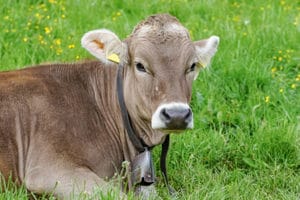You Don’t Have to Choose
[This article was previously published in the fall issue of The Cultivator, Cornucopia’s quarterly newsletter.]
by Kestrel Burcham, JD
Farm and Food Policy Analyst at The Cornucopia Institute
 |
While both USDA certified organic and grass-fed beef offer significant benefits compared to products produced by cows confined to a feedlot, these two labels are different.
USDA certified organic cattle must be fed entirely certified organic feed, which means the pastures must be certified along with any grain and hay the cattle are fed. None of the organic feed, including the pastures on which the cattle graze, can be sprayed with pesticides or herbicides.
In addition, organic beef cattle cannot receive antibiotics, growth-promoting hormones, or other drugs banned in organics. Also, unlike conventional cattle, organic cattle must graze for a certain percentage of their diet.
If beef carries the “100% grass-fed” label, it usually means that the cattle were fed grass, hay, and other forage. Some third-party certifications for “100% grass-fed” allow cattle to consume things like molasses, which adds calories to the livestock diet.
However, beef that carries the grass-fed label, but not the organic label, may receive antibiotics and hormones, and may be fed grass and forage that was sprayed with pesticides. These chemical inputs have negative implications not fully addressed by the grass-fed label.
Consumers seek out both organic and grass-fed products because of their benefits to human health, animal welfare, and the environment.
A high percentage of green forage in a beef animal’s diet imparts much higher levels of omega-3 fatty acids in the meat, and animals grazed on fresh green forage produce beef with more conjugated linoleic acids (CLA) as compared to beef from animals fed stored hay, and especially grain-fed cows.
These fatty acids have proven health benefits. Eating grass-fed meat and dairy is among the most effective ways for humans to increase the amount of these essential fatty acids in their diets.
As ruminants, cattle evolved to eat mainly grass and other fresh vegetation. The microbiome in the rumen, part of their stomach, excels at breaking down fiber to provide the animal with easily absorbed nutrients.
Despite this, most beef produced in the U.S. is grain-fed. Eating grain disrupts the normal digestive process and, as a result, acid builds up and causes physiological stress.
This “acidosis” from grain-based diets permits the growth of harmful microorganisms, including E. coli, and metabolic disease in animals. Conventional cattle are given antibiotics to treat diseases caused by acidosis.
Feeding cattle a diet composed primarily of grass not only prevents acidosis and its associated health problems, but grazing promotes cattle’s overall physical and mental health.
Greenwashing tactics are also common with grass-fed labeling. A simple “grass-fed” label without any other qualifiers can just mean that the product was derived from livestock that received some portion of its diet from grass.
That animal could have still received some grain, and may have been completely “finished” on grain, which negates many of the health benefits associated with grass feeding. However, a label with “100% grass-fed” language closes this loophole, due to basic laws regarding truthfulness in food labeling.
Looking for the grass-fed label without knowing how and where those cattle were actually grazed can be problematic. Some beef carrying the grass-fed label comes from cattle raised on delicate public lands.
Cattle, which are not a species native to the U.S., can cause serious issues with erosion and the destruction of riparian habitats, and can encourage the spread of invasive species.
In contrast, proper pasturing practices, such as rotational grazing, can be an essential part of regenerative agriculture.
If you are interested in the three-fold benefits to human, environmental, and animal health, look for beef that carries both the USDA organic seal and the 100% grass-fed label. That way, you can ensure the greatest nutrition and shield yourself from exposure to agrichemicals, antibiotics, and growth hormones.

